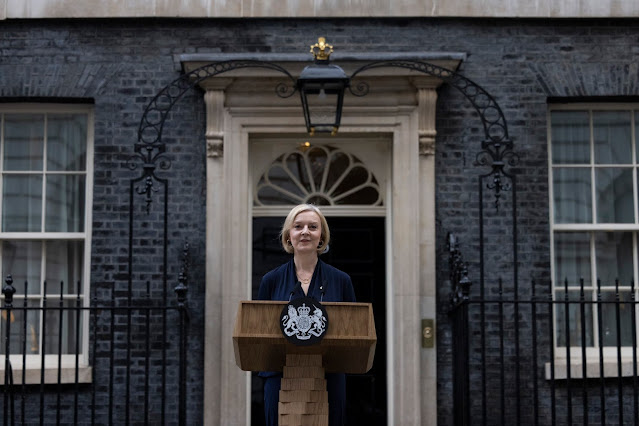Silent Coup or Disastrous Economic Plan? UK Conservative Party Forces PM Liz Truss to Resign After 44 Days in Power
 |
| UK Prime Minister Liz Truss addressing reporters at Downing Street, London Photo: Twitter |
The UK Prime Minister Liz Truss is stepping down from her Prime Minister role after only 44-days in power, having lost control of the ruling Conservative Party.
She took over the reins of the Conservative Party on 6th September 2022 after former Prime Minister Boris Johnson resigned following mutiny in the party.
A myriad of scandals that dotted Boris Johnson's tenure made his resignation inevitable with even close allies calling for his head.
The then UK Foreign Secretary Liz Truss, who was later elected the Prime Minister, said of Johnson's resignation as the "right decision" while asserting on the "need for calmness and unity".
Liz Truss was elected as Prime Minister at the worst possible time in the UK history with inflation rising above 10% for the first time in 40 years and average energy bills at a record 54% higher. The UK was also poised for recession with the British pound's value on the decline.
Her own conservative MPs had so little faith in her ability to address the issues the UK were facing at the time that some privately anticipated her forced removal from office before the next election slated for 2024. Her aggressive campaigns proved problematic even to some of the most loyal Conservatives.
Unfortunately, Prime Minister Liz Truss' tax plans that promised an unprecedented period of growth to revive the economy resulted in the value of the pound tanking after the economist questioned how she planned to pay for it.
The skeletons of former PM Boris Johnson who plans to make a comeback came back to bite PM Liz Truss with the cost-of-living crisis spinning out of control. The inflation rates hitting record highs with the British Pound's value on the other end of the pendulum.
Despite winning the vote of "no confidence" where over 40 Tory members abstained, calls to have her resign from within the party ranks grew only louder and noisier.
On Thursday, the Prime Minister bowed down to pressure at Downing Street.
Prime Minister Truss cited "energy bills" and the cutting of "national insurance" as well as "continued stand with Ukraine to protect our own security" as some of the upsides of her administration.
She also stated that her government set out "a vision for a low tax, high growth economy" presumably for future administration.
Having lost control of the party, she notified His Majesty the King of her intent to resign as a Leader of the Conservative Party. A new leader is to be elected in a week. In the meantime, Liz Truss will remain as the Prime Minister of the UK.
While many in the UK may celebrate her decision to resign with an economic crisis at hand, and the value of the pound at its lowest; it will take a miracle to turn around the economy within the shortest time possible.
With members of the Conservative Party losing faith in their new leader barely two months after electing her to office, it is no telling what awaits the next premier of the United Kingdom in the coming months. The precedence is already set, and it is no telling how the party will receive Prime Minister Liz Truss's successor.
With her resignation, residents of the UK may breathe a sigh of relief with the hope that better economic times await them with the new leadership. However, many questions still linger in people's minds.
Did Prime Minister Liz Truss deserve more time to implement her economic plans? Did having some Conservative MPs question her ability to lead the UK successfully out of the crisis they faced hurt her chance of succeeding from the very start? Did she even have a chance of succeeding?
Will the new Prime Minister successfully united the "impatient" party, and lead the country out of an apparent recession? Will the new Prime Minister withstand the wave of mistrust within the ranks of the Conservative Party?
Comments
Post a Comment